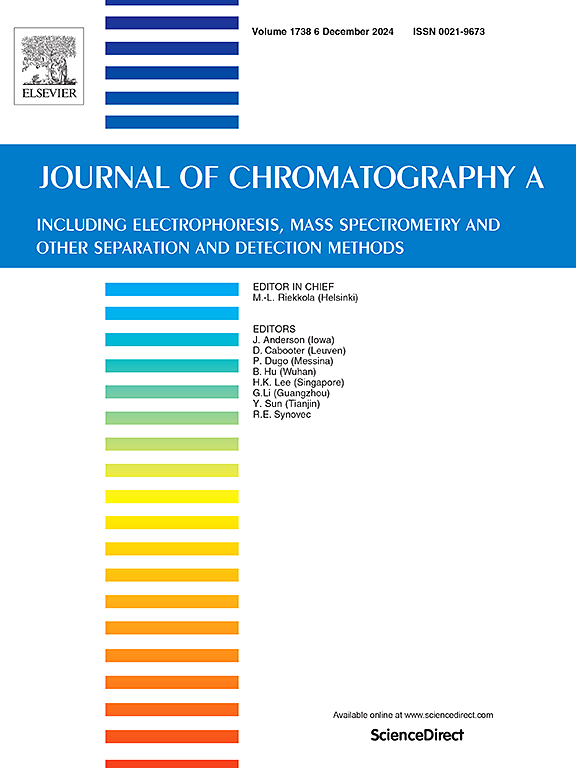反相液相色谱法中天然产品全局保留模型的可转移性。
IF 3.8
2区 化学
Q1 BIOCHEMICAL RESEARCH METHODS
引用次数: 0
摘要
通过应用多线性梯度全局保留模型,在提高反相液相色谱分析复杂样品的分辨率方面取得了长足的进步,特别是在天然产品领域。全局模型可有效区分溶质保留效应与色谱柱和溶剂的保留效应,其预测能力可与传统的单个保留模型相媲美,且无需所有化合物的标准。虽然传统的单个模型具有更高的准确性,但它们往往需要天然产品样品所不具备的标准。此外,由于需要对更多化合物进行重复工作,创建单个模型可能会耗费大量时间。全局模型的实验验证表明,其准确性足以预测复杂色谱图。通过精心设计的实验工作,本研究报告正确确定了色谱柱和溶剂的全局参数,并在各种药用植物样品中保持了极好的一致性。研究证实,在不同植物(柠檬香脂、薄荷和菥蓂属植物)中成功转移了预测结果并优化了分辨率。这凸显了使用全局模型对不同植物品种进行预测的适用性。本文章由计算机程序翻译,如有差异,请以英文原文为准。
Transferability of global retention models in reversed-phase liquid chromatography for natural products
Considerable progress has been made in enhancing resolution in reversed-phase liquid chromatography for the analysis of complex samples, particularly within the field of natural products, through the application of global retention models using multi-linear gradients. Global models effectively differentiate solute retention effects from those originating from the column and solvent, offering predictive capabilities comparable to conventional individual retention models, without the requirement for standards for all compounds. While conventional individual models result in higher accuracy, they frequently demand standards that are unavailable for natural product samples. Moreover, the creation of individual models can be time-consuming due to the need for repetitive work for additional compounds. Experimental validation of global models has demonstrated that the accuracy is enough for the prediction of complex chromatograms. Through a carefully designed experimental work, this study reports the correct determination of global parameters for column and solvent, with excellent consistency across various medicinal plant samples. The successful transfer of predictions and optimisation of resolution across diverse plant species (lemon balm, peppermint, and pennyroyal) is confirmed. This highlights the applicability of predictions using global models across botanical varieties.
求助全文
通过发布文献求助,成功后即可免费获取论文全文。
去求助
来源期刊

Journal of Chromatography A
化学-分析化学
CiteScore
7.90
自引率
14.60%
发文量
742
审稿时长
45 days
期刊介绍:
The Journal of Chromatography A provides a forum for the publication of original research and critical reviews on all aspects of fundamental and applied separation science. The scope of the journal includes chromatography and related techniques, electromigration techniques (e.g. electrophoresis, electrochromatography), hyphenated and other multi-dimensional techniques, sample preparation, and detection methods such as mass spectrometry. Contributions consist mainly of research papers dealing with the theory of separation methods, instrumental developments and analytical and preparative applications of general interest.
 求助内容:
求助内容: 应助结果提醒方式:
应助结果提醒方式:


